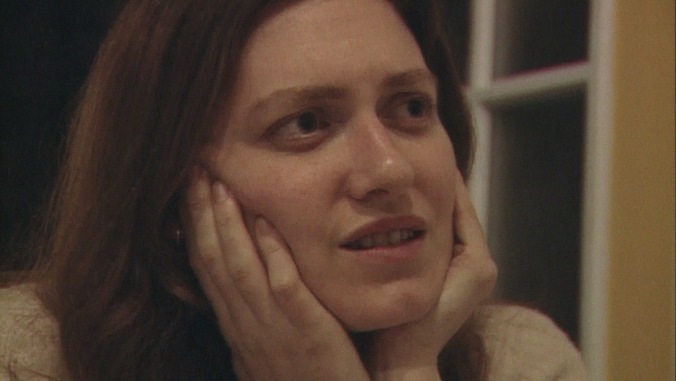The lo-fi comedy The Plagiarists has a deceptive literary twist

The Plagiarists, a no-budget, lo-fi comedy of millennial manners and neuroses, is one of those movies a critic hates to spoil. Suffice it to say that some of its misdirections are more obvious than others—beginning, very literally, with the fact that its credited director, one Peter Parlow, appears to be about as real a personage as Mickey Mouse. (The one-man-band James N. Kienitz Wilkins is otherwise credited as the film’s co-writer, producer, cinematographer, editor, and colorist; if Parlow does exist, it must have been an easy gig.) But then, tiptoeing around an inexplicable act of deception is what The Plagiarists is all about. Its satirical targets and its intended audience are to some extent one and the same: the college-educated, freelance creative class who yearn, like every generation going back to Don Quixote, for the more authentic experiences and forms of an earlier time.
Even its cheapoid visual style (the film was shot entirely on vintage Betacam news cameras) constitutes something of a meta joke on the scenario concocted by Wilkins and co-writer Robin Schavoir—a literary what-if in which the work of Karl Ove Knausgård plays no small role. We open on a couple of self-described “city people” stranded on a country road, a set-up familiar from countless jokes and cautionary tales. Perhaps The Plagiarists is meant to be a little of both. Tyler (Eamon Monaghan) is a filmmaker who shoots commercials and branded web videos to pay the bills; Anna (Lucy Kaminsky) is a writer who’s been procrastinating on the manuscript of an autobiographical novel that she insists is not a memoir. They don’t know much about cars. Neither does Clip (Michael “Clip” Wayne), a friendly older man who interrupts their argument and offers to help push their Volkswagen to his property around the corner. He tells them he can hook them up with a cheap local mechanic—and besides, it’s freezing cold out and Anna needs to use the bathroom. So off they go.
Anna and Tyler are white and in their late 20s or early 30s. Clip is black and about 60. This matters insofar as it informs the gymnastic social fumbling that The Plagiarists mines for its first half, as the couple try to make conversation with their genial host—the near-gaffes and backpedaling reflexes that threaten to erupt into a howling parody of bougie sensibilities and niceties without ever quite getting there. (Adding another layer of discomfort to the proceedings is that the fact that Wayne reportedly filmed his performance without ever meeting the other two actors, an artistic technique that The Plagiarists shares with the work of Mark Region and Edward D. Wood Jr.) They end up spending the night at Clip’s house. In the morning, Anna and Tyler wonder what they could give him to repay his generosity. In all earnestness, they settle on gifting him a Blue Apron subscription.
The second half of the film picks up months later, as Anna and Tyler return to the area to visit a friend. It’s here that The Plagiarists makes its left turn—though part of what’s fun about its twist is that it’s simultaneously so intellectualized and so offhand that Anna ends up spending a significant chunk of time explaining how it constitutes a reversal of expectations. Throughout, Wilkins and Schavoir show a well-tuned ear for the foibles and blunders of a particular social stratum—the way a conversation plays out while an NPR review of You Were Never Really Here drones pleasantly in the background, or how the characters keep falling back on sexual assault as a metaphor for any kind of betrayal, only to backtrack. (The performances, on the other hand, are somewhat less convincing.) Ultimately, it’s the awkwardness that they’re prodding. The Plagiarists isn’t asking why one person would tell a lie, but why another would be so bothered by it—an ambitious line of inquiry for which the film provides more references than concrete answers.